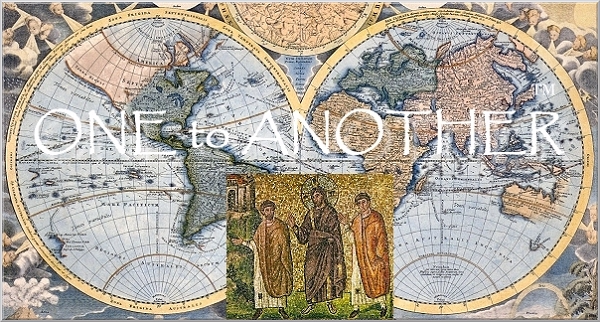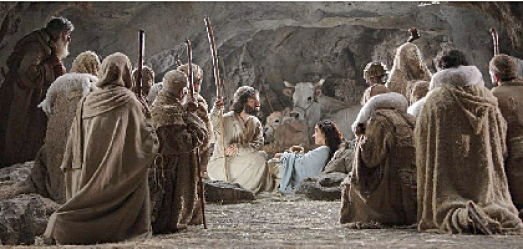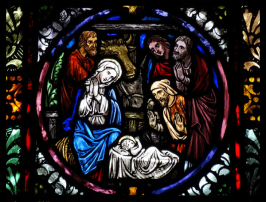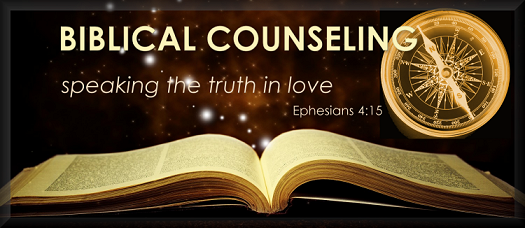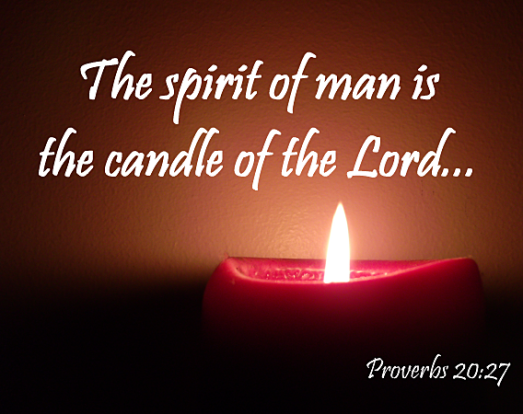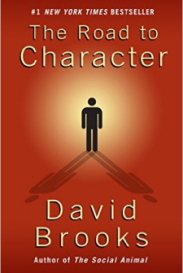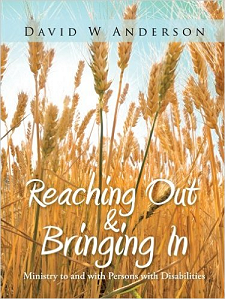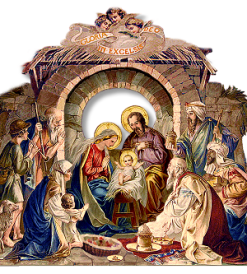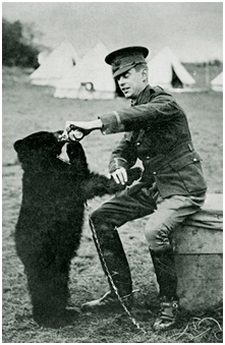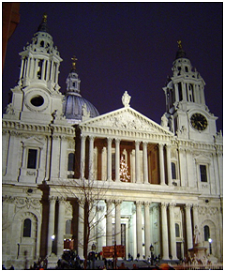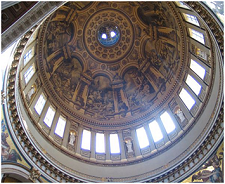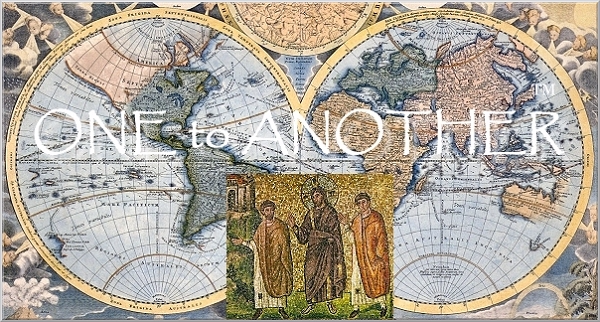MASTER'S International UNIVERSITY of Divinity
Bi-Monthly Information and Teaching Journal
ONE to ANOTHER ~ December 2016 - January 2017 ~ Volume III ~ Issue 1
In This Issue
Christmas Away from Home | Keeping Christmas | Candle of the Lord | Book Review | Christlike in A Broken World
The Word Made Flesh | Robins, Wrens and Monuments |Silent Night | Feathers in the Wind
ad-vent | noun - the arrival of a notable person, thing or event
- His Promise - foretold by the prophets - Isaiah 9:6
- His Place - among the children of men - II Corinthians 8:9
- His Purpose - the redemption of the human race - John 3:16
- His Passion - no one took His life for He gave it - John 10:18
- His Power - the power of God unto salvation - Romans 1:16
- His Parousia - the promise of His return - Acts 1:11, Revelation 22:20
“Joseph also went up from Galilee, from the city of Nazareth, to Judea, to the city of David which is called Bethlehem, because he was of the house and family of David, in order to register along with Mary, who was engaged to him, and was with child. While they were there, the days were completed for her to give birth. And she gave birth to her firstborn son; and she wrapped Him in cloths, and laid Him in a manger, because there was no room for them in the inn” (Luke 2:4-7 NASV).
There are many reasons and places to experience a first Christmas away from home. If you have, you understand. Have you thought of the first time anyone spent Christmas away from home - the very first time? Have you thought of Mary and Joseph in this way? About 90 miles south of their home in Nazareth, they experienced the very first Christmas in the ancient city of Bethlehem, and away from home. There Mary gave birth to her miracle child.
However, this miracle child of the Virgin Mary was never just a newborn, never just a baby, never just a toddler, never just a youngster, never just a stepson. He was those things to be sure, but as He was, He was also the Wonderful Counselor - He was the Mighty God - He was the Eternal Father - He was the Prince of Peace - He was God with us. I n addition, something more about Him ought to be recognized. He was the very first Person ever to spend Christmas away from home.
On the first Christmas, the Savior of the world had condescended to men of low estate. He had left the splendor of heaven, He had sat aside His royal rights, He had incarnated as a human being in order to become the supreme and ultimate Sacrifice for the sin of the world. He was His own Christmas gift to us!
So, whether you are home or away this Christmas, you have already been given the greatest Gift ever given among mortal men. "Thanks be unto God for his unspeakable gift" ( II Corinthians 9:15 KJV).
Psychology seeks to explain and fix life through an interpretation of human life that excludes God, sin, sanctification, Christ and His Word. Just as evolution is man’s explanation how we got here without God, psychology attempts to explain behavior and moods without God.
What God has said about human feelings and behaviors is true. He is reliable. What the Bible says about people and their problems will never be destroyed by any so-called scientific findings of man. Real science will always glorify the Creator. As someone once said, "the Bible is an anvil that has worn out a thousand hammers."
Medical science discovers many interesting facts about the human body. Some of these findings enable doctors to cure diseases. However, psychology is not a science and is not able nor ever will be able to explain what we are, why we do what we do and how we can change.
As Biblical counselors, we regularly meet people who are not Christians. Our counseling turns to evangelism. We have a story to tell that is simple and sublime. What can be simpler than “believe and live?” What is more sublime than “God was in Christ reconciling the world to Himself" (II Corinthians 5:19)?” The shepherds did not hesitate to take the announcement of the Savior’s birth to the people.
What they told they first “received.” It was on a hillside as they tended to their sheep. The messenger was an angel that testified “Unto you is born this day, in the city of David, a Savior, which is Christ the Lord” (Luke 2:11). We have received that message and believed. We keep Christmas every day by telling others.
We continue our study of the Holy Spirit - (Read Proverbs 20:27 and I Thessalonians 5:18-24)
An individual once did research on the safest of all places that one could be. He arrived at some very interesting conclusions.
He found that 20% of all fatal accidents happen in automobiles; 17% of fatal accidents happen at home; 14% of all fatal accidents happen while one is walking on a sidewalk; 16% of all fatal accidents happen while traveling by air, rail, or water; 33% of all deaths occur in hospitals.
However only .001% of deaths occur in church; therefore the safest of all possible places to be is in church. Aren’t you glad that you attend weekly?
And probably the safest of all possible things to do is study the Scripture; this we will do in this article. In our study text the Apostle Paul declares that:
I. Man is a Trinity: Body, Soul, and Spirit (I Thessalonians 5:23)
Paul’s prayer for the Thessalonian Christians was for sanctification. This word means to be set apart for God’s glory, worship, and service. Paul’s sanctification prayer had a threefold application: sanctification for body, soul, and spirit. Thus man exists as trinity – a tri-part being.
The historical creation account of Genesis states that God created man in His image (Genesis 1:26-27). Part of this image is tri-personality. As the one God exists in Father, Son, and Holy Spirit, so man exists as body, soul, and spirit.
The most obvious part of man is body. The body is what we see. The body is the tabernacle or dwelling place for the soul and the spirit. The body is the gate through which world data enters for information gathering, analysis, and decision making. And since the body is the visible, physical, feeling part of our existence, we spend much time catering to the needs and desires of the body.
The Apostle Paul presents this challenge: I beseech you therefore, brethren, by the mercies of God, that you present your bodies a living sacrifice, holy, acceptable unto God, which is your reasonable service (Romans 12:1). You may have noticed that at times the body’s desires can get us into spiritual trouble. That’s the reason Paul challenges us to present, give, or commit our bodies unto the Lord for His honor and glory. If I cannot do it for the glory of God, I should not do it (I Corinthians 10:31).
The soul is that part of man’s creation which thinks, reasons, feels, and decides. It provides a world-consciousness. The word “mind” gives us some indication of the soul’s function. The Apostle Paul instructs us thusly: And be not conformed to this world: but be ye transformed by the renewing of your mind, that you may prove what is that good, and acceptable, and perfect, will of God (Romans 12:2).
Note the words renewing of your mind. Currently the natural mind is controlled by a fallen, sinful nature (Romans 3:23). When one comes to Christ in the salvation experience (Acts 16:31), the potential for mind renewal is present (II Corinthians 5:17; Galatians 6:15). Our mind is renewed as we place the Word of God within it (Hebrews 4:12). The point is: What we put in is what we meditate upon; what we meditate upon is what we become. If we put in that which is worldly, we become worldly. If we put in the Word of God, we become godly; our minds are renewed.
The third part of man’s trinity is spirit. Spirit gives us God-consciousness (Job 32:8). God deals with us in our spirit. In our spirit we come to salvation through trust and reliance in Jesus as Lord and Savior (John 1:12). At the moment of salvation the Holy Spirit takes His abode in our spirit (I Corinthians 6:19-20). Form our spirit, He (the Holy Spirit) does His work within us. From our spirit the Holy Spirit is to have control of our soul (mind) and body. This is what it means to be filled with the Spirit (Ephesians 5:18). It is to be controlled by the Holy Spirit. We are to depend upon and be sensitive to the inner promptings of the Holy Spirit.
Thus man exists as trinity: body, soul, and spirit. Let us now consider one very interesting application of this biblical reality. The author of Proverbs tells us that
II. The Spirit of Man is the Candle of the Lord (Proverbs 20:27)
All of us, I would imagine, are familiar with candles. I can remember as a child, my mom would always keep a supply of candles. We lived in the country and there were many times the power would go out. At that point the candles would come out. So we are familiar with candles; we have used candles and have some understanding of the candle’s value.
The Scripture says, The spirit of man is the candle of the Lord (Proverbs 20:27). Consider the implications of that truth.
The candle is crafted to give light. The light of the candle is to scatter the darkness. The light of the candle protects us from running into things the darkness would conceal from us. The light of the candle shows us the safe way to travel. The light of the candle calms our fears. The point is: the candle is made to give light. If it does not give light, it is not fulfilling its purpose of creation.
The only way a candle can give light is when the fire is applied. If there is no fire, there is no light. Without the fire the candle is dead or useless. Yes, certainly the candle exists but it is not fulfilling its purpose; it merely exists.
The Bible teaches that The spirit of man is the candle of the Lord (Proverbs 20:27). The spirit of man exists in every man. However the only way that the spirit of man can have life or can fulfill its purpose for existence is to have the fire of God light it.
John the Baptist said of Jesus, He shall baptize you with the Holy Spirit and with fire (Luke 3:16). When one comes to Christ relying upon Him as Lord and Savior, the fire of the Holy Spirit lights that man’s candle; his spirit is made alive. No longer is that individual “just existing,” that individual has eternal life!
Hear the Scripture again: The spirit of man is the candle of the Lord (Proverbs 20:27). Have you allowed the Lord to light your candle with His fire? If not, you merely exist. If you will receive Him by faith, the spiritual fire will come and your spirit will be made alive. You will have eternal life. There is a choice to make. I can exist or I can have eternal life. Jesus waits for our reply (Revelation 3:21).
Review: The Road to Character
by David Brooks, NY: Random House, 2015, 300 pages
Cheryl A. Durham, M.Min., Ph.D., Dean of Students
David Brooks, op-ed columnist for the New York Times writes an interesting volume in light of what some Christians believe about a secular society. It seems that Brooks is pining for a world in which God’s values (although God is not overtly acknowledged in this volume) are primary. It seems he hasn’t figured out that you can’t "have your cake and eat it too." Without acknowledging God as the source it seems that the Road to Character might be harder than it needs to be.
Ironically, Brooks uses quotes from Rabbi Joseph Soloveitchik, a contemporary of Abraham Joshua Heschel, who posits the idea of two Adams (an allusion to the struggle of man with his two inclinations, good and evil). Each Adam represents two sides of a struggle that man inherently has to do good, or evil; in Christian terms, choose God or sin.
Brooks’ goal is to focus on Adam 2, to show what character building "should" be and uses his own as well as biographical essays to illustrate various points. He shows in all the essays that “Humility is freedom from the need to prove you are superior all the time, but egotism is a ravenous hunger in a small space” (p.8). The author makes stunning points comparing the WWII generation with their children (Boomers) and grandchildren (Gen Xers) and even the Facebook generation (Millennials) and how the ego focus has changed.
The various essays tell the stories of relatively famous people in their life struggle to achieve some goal. These goals usually present themselves as a nagging problem in the person’s life that persists throughout their lives. The characters choices span a century and as one reads the various biographies, one gets a sense of how things morphed into the narcissism that is prevalent today; the pendulum always swings. Often, however, each character gets a sense of "something greater" (I wonder what that is), and their lives take abrupt changes.
Chapter One is the Shift, which talks about the author’s life and how he came to write the Road to Character. Chapter Two is the Summoned Self and the story of Frances Perkins and the Triangle Shirtwaist Factory Fire. Chapter Three is on Ida Eisenhower, mother of President Ike Eisenhower and is entitled Self-Conquest it describes her influence on his life. Chapter Four, Struggle, was the story of Dorothy Day and her work with helping the poor. Chapter Five, Self-Mastery is about George Marshall. Chapter Six, Dignity, is about A. Phillip Randolph. Chapter 7, Love is the unusual story of Mar Ann Evans otherwise known as George Eliot. Ordered Love, Chapter 8, is the story of Augustine’s God encounter. Chapter Nine, Self-Evaluation tells the story of Samuel Johnson and finally Chapter 10, The Big Me, compares and contrasts the stories of Johnny Unitas and Joe Namath, both superstars in sports.
In the last chapter, Brooks gives us a summation of what he thinks has changed. He sees it as a worldview shift from Biblical times to the 1960’s America and beyond. While I would disagree with what he calls "biblically based," his insights do ring true to the contemporary reader. I would recommend this book to pastoral ministry or biblical counseling students who study cultural trends and their effect on the believing community as wells how one behaves as a believer in the current cultural climate.
Being Christlike in A Broken World -
Part 1
David W. Anderson, Ed.D., D.B.S.; Program Developer and Director for the Master of Arts Certificate in Disabilities Ministry
Dr. Anderson's book, Reaching Out & Bringing People In : Ministry to and with Persons with Disabilities, ISBN 978-1-4497-9095-0, Westbow Press, 2013 can be purchased through Master's Bookstore or Click here to purchase.
PART 1 OF 4
God has always been working behind the scenes to accomplish his will. But God acted more directly when Jesus entered the world in human form to proclaim the good news of the kingdom and demonstrate the power and love of God. Satan’s dominion began to crumble when Jesus prevailed over his attempts to divert Jesus from his mission (Matthew 4:1–11), cast out demons and released people from the bondage of disease or disability (Matthew 12:28; Luke 9:11; Acts 10:38), and brought freedom from the power of sin and death at Calvary (Romans 8:2; Hebrews 2:14).
In the truest sense, the battle has always been the Lord’s, but until Satan is cast into the lake of fire (Revelation 20:10), Christians are engaged in spiritual warfare. Jesus’ mission was one of concern for people in need of good news, held captive by sin or circumstances, treated unfairly, and spiritually and emotionally distressed (Luke 4:18). We are commissioned to continue this mission by taking the gospel message to the whole world (Matthew 28:18–20). Following a Jesus’ lead in ministry means having a similar focus and intent, conforming to his model of how we are to “be” in the world.
Individuals and families affected by disability fit into the collective “Luke 4:18” group; thus, to be in alignment with Jesus, we must also reach out to people with disabilities who need to come to faith in Christ as much as persons who are able-bodied, but also need to be delivered from the captivity and distress caused by the lie that they are worthless, their life meaningless, they are less than human. We must share with them the fullness and beauty of the gospel and free them from the spiritual oppression and bondage that Satan and the world inflict.
Many churches fail to intentionally reach out to individuals and families whose lives are impacted by disability, perhaps assuming people with disabilities have nothing to offer or are unworthy of the time and effort, or excusing their lack of concern by arguing that social and governmental programs meet their needs. Many simply have a wrong theology of disability (such as the disciples in John 9:1–2).
These responses are naive and neglectful. Obedience to Jesus’ commission to take the gospel to every people group (Mark 16:15) necessarily includes outreach to individuals and families affected by disability: evangelistically, sharing Christ with them; spiritually, giving them hope in the Lord; physically, nurturing latent talent and teaching new skills; materially, meeting their needs as God enables us; and relationally, building community to allow people with disabilities to minister to and with others.
Being like Christ in a broken world requires transformation in character. This begins when we became a new creation in Christ Jesus (2 Corinthians 5:17), but transformation is an ongoing process of renewal and spiritual growth as we daily offer ourselves to God and are molded more into the image of Christ (Romans 12:1–2). Four aspects of Christlikeness that relate to disability ministry are incarnation, vulnerability, servanthood, and justice. This essay centers on incarnational ministry; future issues of ONE-to-ANOTHER will address the other three aspects.
The incarnation of Jesus is an essential doctrine in Christianity and constitutes an appropriate starting point for ministry to persons with disabilities and their families. John 1:14 states that Jesus became flesh (“incarnated”) and made his home among us. Four components help us understand the significance of Jesus’ moving into our neighborhood:
(1) Jesus identified with humankind. By becoming human and living among us, Jesus voluntarily submitted to the limitations of humanity (Philippians 2:6–8). Jesus shared the same experiences as all people—attending worship, learning a trade, being tempted, being misjudged and misunderstood, sorrow, suffering, and death. The only thing he did not share with humankind was sin.
(2) Jesus broke through humanly erected barriers. He was not passive in ministry, but readily engaged others, whatever their situation, responding to their felt needs. He identified with the common folk, not the religious leaders. At times, he seemed to go out of his way to meet individuals: Zacchaeus (Luke 19), the disabled man lying by the pool of Bethesda (John 5), the man who had been blind since birth (John 9), the woman of Samaria (John 4). He was not shy about establishing a relationship with “Luke 4:18” people. When he looked at an individual with a disability he saw a person who needed respect, love, and embrace.
(3) Jesus maintained a close connection with the Father, carefully obeying his will, speaking the words of God (John 3:34), and patterning his actions after what he saw the Father doing (John 5:19–20). Thus, Jesus acknowledged both his humility and his unity with the Father. He acted not out of self-interest, but to honor and obey the Father while bringing release, renewal, and reconciliation to individuals.
(4) Jesus enacted the love of God. “Incarnation” subsumes the idea of embodiment. 1 John 4:7–8 says love comes from God because God is love. Jesus was a physical presentation of God’s love (John 3:16). Rather that simply talking about God’s love, he communicated it through his actions, breaking the oppression which many experienced because of disease or disability, political subjugation, or their own or others’ sinful actions, even from the religions elite. Jesus’ ultimate demonstration of love was his willingness to die on the cross for our salvation. Rather than something abstract and offered from a distance, Jesus embodied God’s love through his words and actions.
Implications for Christians
As the “Body of Christ” (1 Corinthians 12:27; Ephesians 4:12), Christians are the location of Christ’s ongoing ministry today. As Jesus’ ministry necessitated his incarnation, so our ministry requires embodiment and action as we strive to create a God-centered community that offers salvation, spiritual care, and reconciliation. We seek to do what Jesus would do, go where he would go, teach as he would teach, and love as he loves. Being incarnate means that we are the embodiment of God’s love as we relate to others.
Jesus modeled how to interact with others by his readiness to disregard barriers of cultural (or religious) prejudice. Like Jesus, we must accept and welcome people with disabilities rather than being fearful and distant. Being incarnational necessitates entering the “world” of those we serve—not by first becoming disabled ourselves, but by living and walking alongside them just as Christ did with those who were pushed aside by the Jewish society of His day.
This requires dismantling architectural, attitudinal, and theological barriers which prevent the gospel from being shared with individuals with disabilities. To establish relationships with “Luke 4:18" people we must evaluate our own assumptions and acknowledge the social, spiritual, and emotional issues that follow from negative attitudes and actions. Interacting with families affected by disability will help us understand their feelings, experience, and needs. We want to build honest personal relationships so that we can meet those dealing with disability at their point of need, just as Jesus did.
As did Jesus, we must maintain “contact” with God, who is the genesis of our physical and spiritual life and the source of love. We love, because he first loved us (1 John 4:19). As Jesus did what he saw the Father doing, we need to stay closely attuned to what God is doing in and around us—even in those who are dealing with disability.
Being called to do God’s work, we become the incarnation of God’s love in the church and community. Jesus was not shy about establishing a relationship with “Luke 4:18” people. We follow Jesus’s example when we lovingly minister to and build relationships with individuals and families who face the struggles associated with being disabled. Our change from being distant or ignoring people with disabilities to being present and willing to become involved testifies to the change Jesus has wrought in our own lives and opens doors to sharing our testimony of who Jesus is and to reconciliation with God through Jesus. As the incarnation of God’s love we must be active in ministering to any person God loves, modeling Jesus’ love as we perform acts of kindness to others.
Conclusion
We (and our church) must consider whether our manner of interacting with people and families affected by disability represents God as a living reality in our lives and, potentially, in theirs. When individuals and families who deal with disability look at us, or our church, do they see the embodiment of Jesus and the healing that his kingdom represents? What more could (should) we and our church do to bring hope and reconciliation to people who are distressed and burdened?
As long as we are in the world, we are the incarnation of God’s character. If the Church is to have an incarnational presence in the world, it must be more open in ministry to (and with) individuals and families dealing with disability. There is no escaping Jesus’s example and teaching in the parables about reaching out to “the least of these” (Matthew 25:24–40) and of including in the gospel invitation those whom society (religious and civil) has tended to reject (cf. Luke 14:15–24).
To be continued in the next issue of ONE to ANOTHER.
Emmanuel - The Word Made Flesh
Bradley Mattes, M.B.S. Adjunct Faculty; President and CEO of Life Issues Institute, Inc.
EMMANUEL - There are few words so packed with excitement and promise! The very first Christmas began the journey of Jesus’ mission to save the world from sin, so that’s ample reason to robustly celebrate the season.
As a pro-life leader, I am also excited about the opportunities that God has set before us regarding the recent election. The prayers of a good many Americans were answered and pro-lifers continue to control the US Senate and House of Representatives. Plus we will now have a pro-life president.
Whatever concerns we as Christians may have about his past, early indications are very good that the President-elect will remain true to his pro-life word. The people he is placing around him are for the most part very solid individuals.
This monumental political development is underserved grace from the Lord of Life. America has wandered far from God’s will on many issues, in particular the protection of innocent human life from womb to tomb.
Now, during this season of celebration, we have before us an excellent opportunity to be joyful on the pro-life front. 2017 could well be the year we end tax funding of Planned Parenthood. I have talked with key congressional leaders in Washington, DC who plan to pass such priority legislation under the terms of “reconciliation.” This means a simple majority would be required in both houses of Congress instead of the 60 votes in the Senate needed to override an anticipated filibuster. Planned Parenthood should be afraid. Very afraid. Losing over one-half-billion dollars of tax-dollar income would be devastating to them.
We also have other pro-life goals on the horizon, such as ending abortion after 20 weeks. Of paramount importance is filling vacancies on the U.S. Supreme Court. We are just a couple of pro-life justices away from reversing Roe v. Wade.
Yes, as we celebrate the birth of our Savior, please also thank our Heavenly Father for the opportunities He has set before us to protect innocent human life from abortion. And be prepared to do what it takes to communicate to your elected officials God’s will on the life issues as legislation comes up. You can easily contact them at our website: www.lifeissues.org
In the meantime, please be in prayer for our new president and members of Congress. Satan will throw everything he can at them to thwart their effort to defend the defenseless—America’s unborn babies.
And, as Tiny Tim said, God bless us, everyone!
Robins, Wrens and Monuments
James J.S. Johnson, Th.D., J.D.
Chief Academic Officer, The Institute for Creation Research
As the year of our Lord 2016 draws to a close, I think about those 12 months of busy-ness. What do we have to show for our journey through those pages of the AD2016 calendar? Was that year worth my/our time on Earth? Was that year one of fruitful service and thanksgiving unto our Lord? What good achievements, what valuable accomplishments, what worthwhile “monuments” are left in our wake, as we sail ahead into the year of our Lord 2017? Thinking about these questions reminds me of robins and wrens, for reasons that follow.
CHRISTOPHER ROBIN
Many children know about Winnie the Pooh (originally written Winnie-the-Pooh), a fictional bear cub who acts a lot like a human child. (The original “Winnie” was a real bear that A. A. Milne
saw at the London Zoo.) Pooh’s imaginary adventure, often read by parents to their wee children, have entertained children of many generations -- what fun it is to romp about on a
“blustery day!” Winnie the Pooh’s adventures (“Winnie-the-Pooh,” “The House at Pooh Corner,” etc.) began in newspaper serials, and later books, authored by Alan Alexander Milne (and illustrated
by Ernest Howard Shepard).
Later, the adventures of Pooh and his friends (Eeyore, Christopher Robin, Tigger, Piglet, Kanga, Roo, Owl, etc.), and later were dramatized by animated cartoon movies. Pooh’s literary creator, A. A. Milne, had a son named Christopher Robin Milne, obviously the source of Mr. Milne’s concept for the “Christopher Robin” who appears as Pooh’s friend and co-adventurer in the Pooh book series. The Milne family life was an ongoing tragedy, apparently, and the available evidence points to a pessimistic eternal destiny for Christopher Robin (Milne), and probably also for his father, author A. A. Milne (who despised the Old Testament – regarding the folly of this, see John 5:45-47).
Winnie the Pooh has made millions of dollars for several individuals and businesses, but what lasting value is that, by itself? It is inferior to treasures laid up in Heaven, which neither corrupt
nor disappear to human thievery. Childhood memories – and gentle stories for toddlers -- are valuable, of course, but how much more precious are experiences and deeds that honor the Lord, which
become “gold, silver, and precious stones” in eternity.
CHRISTOPHER WREN
The name “Christopher Robin” reminds me of a similar name, featuring a different bird: Christopher Wren. Sir Christopher Wren was an expert in engineering science, a science professor and
(better known as) the leading architect of his generation. Wren was the architect responsible for building dozens of English churches after London’s Great Fire (of AD1666), including St. Paul’s
Cathedral, England’s Royal Observatory, and the Wren Library at Cambridge’s Trinity College, etc.
But the crowning architectural achievement of Christopher Wren, from 300+ years ago, is the Anglican church titled St. Paul’s Cathedral, which rests atop Ludgate Hill, the highest part of London – at a site said to have hosted an earlier church building (named for the apostle Paul) founded around AD604, -- ironically, by an invader/activist named Augustine of Canterbury (who is infamous for persecuting the British Celtic Church to the point of orchestrating slaughter of their presbyters at Bangor).
Christopher Wren’s greatest earthly memorial, of course, is St. Paul’s Cathedral itself, which includes a Latin inscription upon the black marble beneath its central dome, that translates to English as:
Here in its foundations lies the architect of this church and city, Christopher Wren, who lived beyond ninety years, not for his own profit but for the public good. Reader, if you seek his monument – look around you. Died 25 Feb. 1723, age 90.
The Latin inscription was composed by Christopher Wren, Jr., his son. Thus his greatest professional accomplishment, the grandiose design and successful construction of St. Paul’s Cathedral, became Christopher Wren’s gargantuan “monument,” more dignified than any cemetery gravestone.
But what kind of achievements will constitute the “monuments” of our earthly lives? Will our deeds, done last year, stand the test of time and eternity, as deeds of faith like those reported in Hebrews chapter 11, the “Hall of Faith?”
"But lay up for yourselves treasures in heaven, where neither moth nor rust doth corrupt, and where thieves do not break through nor steal" (Matthew 6:20).
Last year, good or bad, is quickly receding behind us – so it is this new year that we must try (under God’s good grace) to be worthy stewards of, so that each day becomes another
“monument” of gratitude and testimony to our great God and Savior. How we use this new year will be a “monument” to what we really value.
For where your treasure is, there will your heart be also.
(Matthew 6:21)
Growing up in a small town in southern Indiana winter came and
lingered a long while. When the snow came we suddenly were blessed with a wonderful new playground. Snow ball fights, fort building, sledding down a hill which was akin to a mountain then.
But today if I go back there, it is difficult to even call it a hill. All those activities provided the neighborhood children many hours of play spending time together.
I recall then, as a youngster being outside after dark in the snow and listening to the silence of the whiteness covering the ground. It always seemed quieter than when there was no snow. That hasn’t changed as even today I enjoy that silence in the snow.
Surrounded by that peacefulness, the Christmas carol, "Silent Night," and the message in the lyrics of the song fill my mind.
Silent Night. All is Calm. Sleep in heavenly peace.
And on that cold clear night, the sky filled with stars, thoughts of the Glory that came down to earth at the coming of our Lord and Savior in the form of a baby flood my heart and mind.
Glories stream from heaven afar.
Radiant beams from Thy holy face.
Listen closely and you can almost hear the Heavenly hosts sing Alleluia.
Christ the Savior is born!
Silent night, holy night!
Son of God love's pure light.
Now, I don’t know if snow was on the ground in Bethlehem on the night Jesus was born. But the seemingly simple, unheralded entrance of the Prince of Peace into the world certainly brought the kind of calm, peace, and quiet sense that all is well that I remember as a child when the snow fell and night fell upon it, and I knew that God had provided a light in the darkness to guide us through our day by day life as we await His return.
Like Feathers in the Wind - Conclusion
James B. Solberg, M.Div., D.D.,
Adjunct Faculty; U.S.A. National Director, Bridges for Peace International
Continued from the previous editions
Aaron and Miriam against Moses
Scripturally, the rabbis and sages base much of their teaching on this subject on Numbers 12. Let’s look at the first ten verses of this chapter:
“Then Miriam and Aaron spoke against Moses because of the Ethiopian woman whom he had married; for he had married an Ethiopian woman. So they said, ‘Has the LORD indeed spoken only through Moses? Has He not spoken through us also?’ And the LORD heard it. (Now the man Moses was very humble, more than all men who were on the face of the earth.) Suddenly the LORD said to Moses, Aaron, and Miriam, ‘Come out, you three, to the tabernacle of meeting!’ So the three came out.
Then the LORD came down in the pillar of cloud and stood in the door of the tabernacle, and called Aaron and Miriam. And they both went forward Then He said, ‘Hear now My words: if there is a prophet among you, I, the LORD, make Myself known to him in a vision; I speak to him in a dream. Not so with My servant Moses; he is faithful in all My house. I speak with him face to face, even plainly, and not in dark sayings; and he sees the form of the LORD. Why then were you not afraid to speak against My servant Moses?’ So the anger of the LORD was aroused against them, and He departed. And when the cloud departed from above the tabernacle, suddenly Miriam became leprous, as white as snow. Then Aaron turned toward Miriam, and there she was, a leper.”
This complaining against Moses by Miriam and Aaron is considered lashon hara, or evil speaking. Not only do the rabbis draw the teachings already summarized above primarily from discussion about this passage, but they make another connection. What is Miriam’s punishment for lashon hara? She is punished with leprosy. Accordingly, the rabbis see a connection between evil speaking and serious skin diseases. There are two other passages which teach about leprosy: Leviticus 12:1–13:59 and Leviticus 14:1–15:33. Much of the rabbinic commentary on leprosy in these readings is related back to the incident of complaint by Miriam. The rabbis, therefore, see this sin of evil speaking as very serious, with dire consequences.
Christian Teaching
Christian teaching generally is not as strong on the prohibition of evil speaking, although modern Christian pastors and teachers, as well as the the New Testament, clearly teach against gossip or
slander. For example, In Ephesians 4:31, Paul warns, “Let all bitterness, wrath, anger, clamor, and evil speaking be put away from you, with all malice.” And in 1 Peter 2:1, Peter directs,
“Therefore, laying aside all malice, all deceit, hypocrisy, envy, and all evil speaking.”
In Ephesians, Paul uses the Greek word blasphemia, from which we get our modern English word “blasphemy.” At its root, blasphemy in our modern usage is “evil speaking” against God. How much more care might we use in choosing our words, if we thought that each evil word, bit of gossip, or bad report we share was a form of blasphemy? In 1 Peter, Peter uses the Greek word katalalia, which is the direct Greek for evil speaking. In both cases, I believe that both Peter and Paul had in mind their Jewish training and the prohibition about lashon hara.
Paul himself uses this exact same Greek word in 2 Corinthians 12:19–20. In the New King James translation, this word is translated as “backbitings.” “Again, do you think that we excuse ourselves
to you? We speak before God in Christ. But we do all things, beloved, for your edification. For I fear lest, when I come, I shall not find you such as I wish, and that I shall be found by you such as
you do not wish; lest there be contentions, jealousies, outbursts of wrath, selfish ambitions, backbitings, whisperings, conceits, tumults.”
In modern Christian teaching, there is still emphasis on the importance of guarding our words, but recent Christian teaching takes an approach more focused at guarding both the words we think and the words that we speak. There is a powerful book by John Bevere, entitled The Bait of Satan, in which he makes the case that we destroy ourselves when we focus our time and thoughts thinking (or saying) evil about another person. His real emphasis is on how bitterness against another—again whether objectively justified or not—damages and destroys the person holding onto these feelings. In this regard, his teaching is very parallel to rabbinic teaching on lashon hara, which teaches that not only the object of evil speech, but the speaker of evil speech is damaged in the process.
The whole concept of “positive confession” or of speaking what we want, not what we have, is somewhat controversial in the modern Church. Some fear this teaching goes too far into the realm criticized as “name it and claim it.” While I believe that wisdom and balance need to be applied here, with all teaching tested against Scripture, it is hard to deny either the biblical or experiential truth that what we think and say has a significant impact on what we experience.
Even modern business studies support this, with secular businesses and sports establishments spending millions of dollars each year on motivational training and consultants. Of much greater importance, there is little room to argue, other than that the Christian Scriptures teach a high importance on guarding our tongue: “If anyone among you thinks he is religious, and does not bridle his tongue but deceives his own heart, this one’s religion is useless” (Jam. 1:26).
Yeshua (Jesus) Himself speaks of both the importance of choosing what we say; and the source of what we say. “For out of the abundance of the heart the mouth speaks. A good man out of the good treasure of his heart brings forth good things, and an evil man out of the evil treasure brings forth evil things. But I say to you that for every idle word men may speak, they will give account of it in the day of judgment. For by your words you will be justified, and by your words you will be condemned” (Matt. 12:34b–37).
Judaism and Christianity—A Comparison
In rabbinic teaching, we find a great depth of instruction on the importance of what we do—in this case, on the importance of how we speak. In at least modern Western Christianity, we find the emphasis placed on what we think or believe. Sadly, sometimes this difference has been exaggerated and portrayed as Jewish people only caring about “deeds” and being bound to legalism. A more accurate criticism is sometimes leveled against modern Western Christianity: that we only care and teach about what we think or believe and not about what we do. Neither of these extremes is a fair portrayal of either rabbinic Judaism, nor of biblical Christianity.
Judaism teaches that we do what we do—including following the halacah(or rabbinic understanding of 613 commandments)—because we love God with our heart. The most basic statement of Judaism is the Shema, a statement of both belief and practice beginning in Deuteronomy 6:4: “Hear, O Israel: The LORD our God, the LORD is one.” Further evidence for the importance Jewish people place on belief as well as action can be found inthe 13 Principles of Faith by Maimonides (a 12th-century Jewish philosopher), each of which is a statement of belief. True biblical Christianity shares this balance of belief and action. For example, in James we read, “But someone will say, ‘You have faith, and I have works.’ Show me your faith without your works, and I will show you my faith by my works” (2:18).
Perhaps even more incontrovertible within Christianity; Yeshua said, “If you love Me, keep My commandments”(John 14:15). As is so often true, I find this statement of Yeshua bridging and combining the best of Christian and Jewish teaching on this subject. In this passage, Yeshua speaks love, which comes from our heart and mind. This same short passage in John also speaks about deeds, in this case, keeping commandments. Yeshua consistently teaches about both our thoughts and our deeds.
This one verse is not an isolated incident in Yeshua’s teaching.
For example, Yeshua regularly teaches about our thoughts: “For out of the heart proceed evil thoughts, murders, adulteries, fornications, thefts, false witness, blasphemies”(Matt. 15:19). “A good man out of the good treasure of his heart brings forth good; and an evil man out of the evil treasure of his heart brings forth evil. For out of the abundance of the heart his mouth speaks”(Luke 6:45). And, in a similar manner, He consistently teaches about the importance of our actions: “And whoever gives one of these little ones only a cup of cold water in the name of a disciple, assuredly, I say to you, he shall by no means lose his reward”(Matt. 10:42). “Give to everyone who asks of you. And from him who takes away your goods do not ask them back. And just as you want men to do to you, you also do to them likewise”(Luke 6:30–31).
In Conclusion (or a Resolution for the New Year)
Both biblical Christianity and Judaism teach an importance of what we say and what we do. Since the words that come from our mouth are the first and quickest connection between thought and deed, it
is a great place to look at the importance of both thought and deed. Here, too, we see the complementing perspective we can gain from both the Jewish and Christian teachings on guarding our
tongue.
Will you join me in a renewed commitment to guard your tongue - to seek to speak well of one another?
PRAYING FOR ALL A BLESSED NEW YEAR 2017!
Copyright © Notice ~ Articles may be freely shared with appropriate credit, but may not be otherwise used without the consent of the author.


